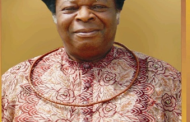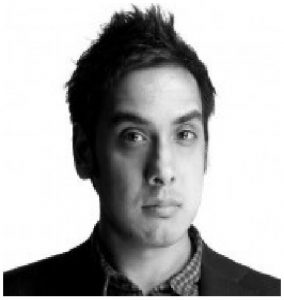The dynamics have worked out in such a way incumbent presidents and the prime minister returned to power in recent elections in Nigeria, South Africa and India. Could the election results speak to a common feature about democratisation in the three countries? The similarities are few after the demographic stature and India’s purchase of Nigeria’s oil. In the case of South Africa, there is their membership of BRICS and the historical connection of the Indian factor in South Africa. Beyond these, they are three different countries.

Prime Minister Modi bows at the swearing-in ceremony
India is a nuclear armed, rising global power and one of the very, very few that is making it to that club without being a manufacturing power. Instead of manufacturing, it is coming in through its anticipation and preparation for informatised capitalism. It has been able to jump into and acquire a seat in the club of rising powers through technology rather than classical industrialisation approach. Who knows if India will not turn out the pioneer of accomplishing industrial civilisation through a stop over in the technological space?
South Africa’s own exceptionalism in democratisation is the Rainbow imagination and its performance of reconciliation. It will take several generations to outlive that imagination in favour of a new one. It is in the club of the rising world powers though more by Jacob Zuma’s intuitive footwork in seizing a rare opportunity in making China see why South Africa should be in that club. That, rather than its current stature in manufacturing did the magic. But that’s not to suggest that South Africa doesn’t have a strategic vision. It does, of course and it is to be a big player in global finance. South Africa is not really a manufacturing economy although, in the African context, it is in a class of its own in this regards. On a global scale, it would rank between 27th and 34th in manufacturing.
Nigeria has its own exceptionalism in democratisation which is that it is so huge a market that, in spite of its unique underdevelopment, the world is still unable to ignore it. Otherwise, it is just not scoring the passmarks in the key human development indicators. That apart, there is no consensus on how it might approach and enter the 21st century. It compares with South Africa on none of the key issue areas. The knowledge industry without which a country cannot talk of the 21st century, for example, is in complete shamble in Nigeria. Neither manufacturing nor any holistic notion of an agricultural revolution is on the table. As worldly and sophisticated as its elite, it lacks a history of being able to form and abide by strategic consensus. It is even the most educated members of the elite who, without any sense of embarrassment, would loudly proclaim that the nation was constituted without any dialogue between the constituent polities. Don’t ask them if there are any nations that were not constructed in one arbitrary manner or another. Not for them the idea that nations do not become great because they are culturally homogeneous but because the national elite wills it.

Ramaphosa being inaugurated last Tuesday
It will take sometime for anyone to answer either way the question as to whether a common feature drives the return to power of the incumbents in the three countries with these varying backgrounds in modernisation. Of the three presidents/prime ministers just returned to power, Cyril Ramaphosa of South Africa and Indian Prime Minister, Narendra Modi have announced their cabinets. Mr. Modi sworn-in today, Thursday, May 30th announced 57 ministers. President Buhari of Nigeria who was sworn-in Wednesday, May 29th, 2019 might take sometime. If he is following the 2015 – 2019 framework of cabinet making, it might take another six months before one emerges. If he has changed tactics, there might be one before too long.
What does Ramaphosa’s cabinet suggest in terms of the question of whether any unifying feature tie the return of the three incumbents? President Cyril Ramaphosa’s approach so far is a strategy of something for everyone. Half of the cabinet or something like that are women. That is concession to gender balancers. Opposition is next, to the extent that, Patricia de Lille, the Minister for Public Works and Infrastructure, was a Mayor under the Democratic Alliance before forming another party with a name that, on the surface, looks funny. But the news of the Ministerial appointment of Nkosazana Dlamini-Zuma is the one that will send waves across Africa.
Jacob Zuma’s former wife is the former African Union top women whom President Ramaphosa narrowly defeated in the contest for the presidential ticket in 2017. She comes into the cabinet as Minister of Cooperative Governance and Traditional Affairs, Samson Gwede Mantashe is not a new ministerial face but, this time, he is minister of the combined mines and energy portfolio. There is a message in making a mandarin or a member of the top six of an established or tested party such as the ANC minister of energy in a country where energy is in crisis. In any case, Mantashe, like Ramaphosa, is coming from the mine workers union that played very crucial roles in the build up to national liberation in 1994.
The gist from this random pick on a few of the faces Ramaphosa is parading is that pedigree counts in any effort at remaking. Ramaphosa is not a study in reversing the statist GEAR, (Growth, Employment and Redistribution) to RDP, (Reconstruction and Development Programme) but he appears inclined to people with the political education, technical capability and a demonstration of that in selecting leadership materials as opposed to toadying, incompetent materials who will never deliver anything even if they are in office for a 100 years.

President Muhammadu Buhari waves at Nigeria at his swearing-in for a second term.
Perhaps the question might be easier to answer after President Buhari of Nigeria has unveiled his cabinet since India is very unlikely to be fundamentally lower than the standards posed by South Africa. Although Time magazine called Modi the ultimate divisive personality, the experience of each of the ministers named does not speak to mediocrity.
The quality of the cabinet matters because all three countries share a crisis of insecurity. From Deli to Pretoria to Abuja, it is a cry for justice from one claimant or the other. Delhi has both internal and external security problems, Kashmir being the external. Internally, other identities fear assertive Hindu nationalism. Claims of an equity crisis especially in terms of land is an explosive issue in South Africa and a historical one for that matter. Nigeria is torn up by insurgencies, narratives of marginalization and multiple centers of resistance against perceived local structures of domination. The outcome is a cauldron of violence being interpreted in a manner that have dangerous performative implications.
In a few decades, India and Nigeria will be ranked the second and third global demographic powers. But India is far ahead in terms of self-grooming for that reality than Nigeria. Hopes are dimming about Nigeria because, above all, it lacks the most minimum of the requirements for that stature in three critical areas: a core of nationalists/leaders thinking ahead and putting their thoughts on the table for discussion; the knowledge industry is in shamble and the infrastructural minimum is just not there. But the country noted for coming first from nowhere might still not have exhausted such mystique!. It might thus not be stupid to still hope to shout Up Nigeria a short while from now!



























